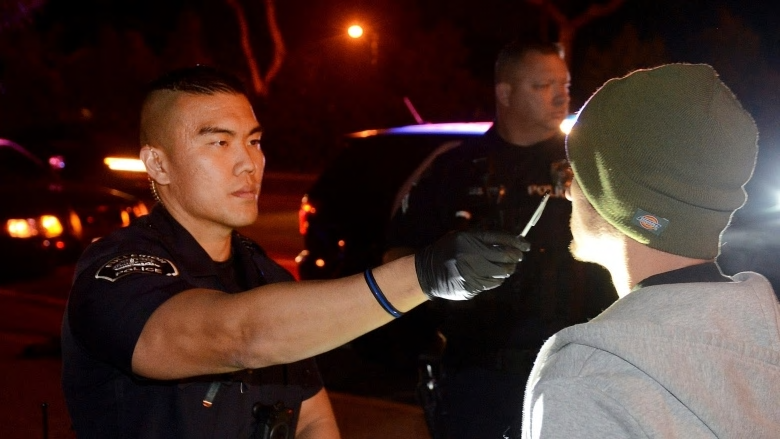32 drug-impaired drivers have been arrested so far this year

In this Saturday, Nov. 19, 2016 photo, Fullerton police officer Jae Song conducts a field sobriety test on driver suspected of driving while impaired by marijuana in Fullerton, Calif. (The Associated Press)
Hamilton police are putting a rise in the number of arrests for drug-impaired drivers down to increased training for officers and say they expect the rate to continue rising once marijuana becomes legal in October.
Police charged a 42-year-old with possession of heroin and cocaine, impaired operation of a vehicle, refusing to provide a sample and driving with suspended and disqualified around 8 p.m. Thursday.
32 drug-impaired drivers so far
Officers spotted a Mitsubishi SUV driving erratically on the Lincoln Alexander Parkway. Police say the driver showed “obvious signs” of being impaired by drugs once he stepped out of the vehicle.
The Hamilton man’s arrest marks the 32nd arrest for drug-impaired driving so far this year. That’s compared to only 29 arrests made over the entire year in 2016 and 2017.
“It’s because of officers being trained with something called the standardized field sobriety test,” said Const. Claus Wagner. “It’s made a huge difference over the last nine months.”

Const. Claus Wagner says Hamilton police are planning to train more officers on how to identify drug-impaired drivers. (Samantha Craggs/CBC)
So far, 59 officers in Hamilton have received the training through the Ontario Police College, according to Wagner. He added the service is planning to run three more training course in September, October and November, to teach about 60 more police how to pick out drivers on drugs.
“It’s very intense training,” he explained. “They try to have one instructor for every three students.”
Not your grandmother’s pot
The constable added the city’s police have to compete with other services across the province who are also fighting to get their officers through the federally funded training before legalization on Oct. 17 of this year.
Once that happens, Wagner said, he expects the number of drug-impaired drivers to keep rising, particularly among new users who aren’t ready for potent pot.
“It’s not our grandmother’s marijuana. It’s marijuana that’s much higher potency, especially the edibles,” he said. “So for someone who’s brand new they’ll … be taking too much and becoming impaired by it.”
Source: CBC News
